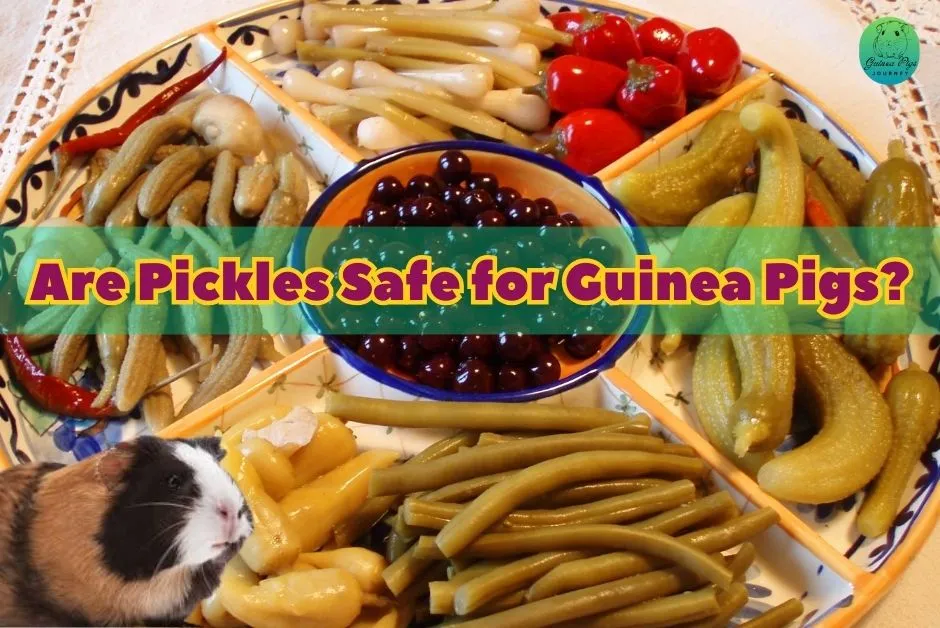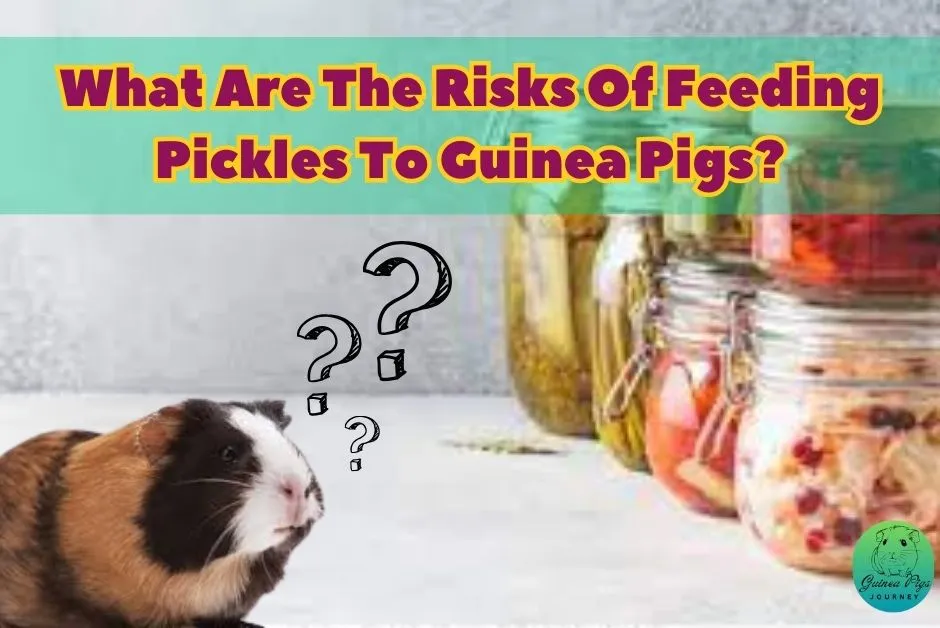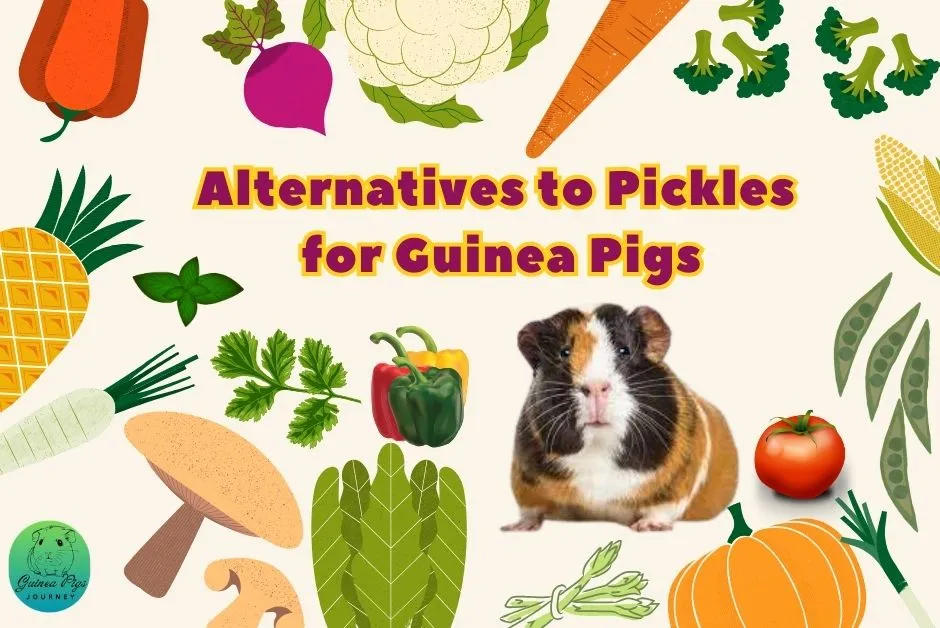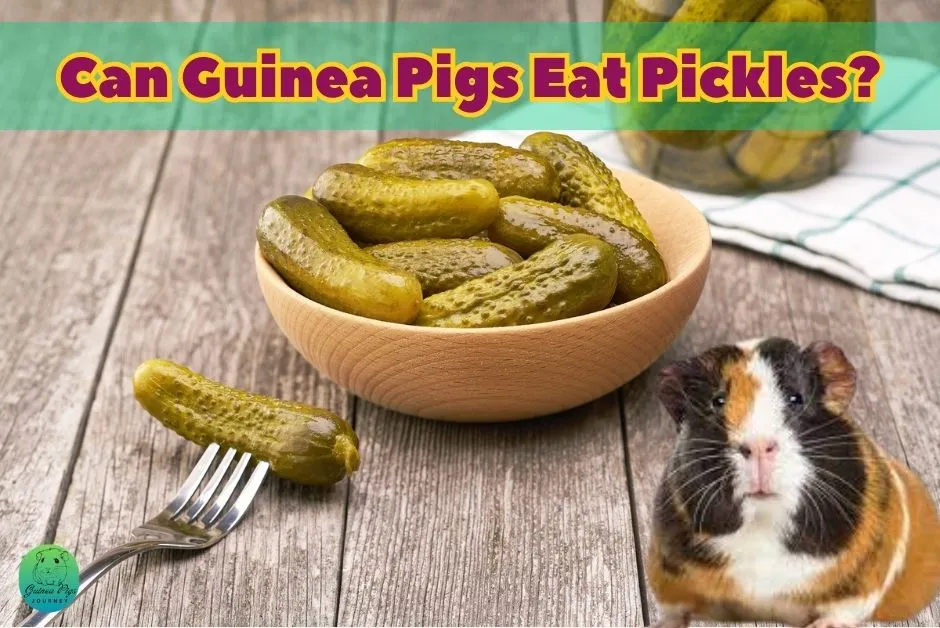Keeping guinea pigs at home is a good idea because these little creatures are very social and loving with their owners and everyone with whom they feel secure but opting for their diet is the significant and responsible thing to do for them, needless to say about the quality and quantity of food they eat would affect their overall health and lifespan greatly. So, you must be wondering a question in mind what is the “Recommended and Best Diet for Guinea pigs” and what are those foods “Not Recommended to feed Guinea pigs” including Jalapenos peppers, olives, Cheerios, etc. and a significant query;
Can guinea pigs eat pickles?
As a general rule of thumb, No, it is generally not recommended to offer any kind of pickle to guinea pigs because Pickles are often high in sodium and contain vinegar, spices, acid, and salt which can be unhealthy and harmful to guinea pig’s health. Pickles for guinea pigs are high in salt and acid can cause serious digestive issues including bloating, stomach ache or upset, high blood pressure, diarrhea, vomiting, acid reflux, kidney pain, etc.
Although many people enjoy pickles for their tasty and crunchy addition alongside any food as a salad or side dish, it does not matter if you like it or not; your guinea pigs are not allowed to eat pickles at any cost since it is a salty food and found with additives and preservatives contained in commercially produced jars are strictly prohibited for your furry friends.
Going through a long guinea pig journey and having these lovely pets taught me to gain a deep understanding and knowledge of pickles for guinea pigs which led me to share this knowledge with my fellow guinea parents, So, let’s quickly go through the nutritional analysis, risks, to answer your query can guinea pigs have pickles.
Are Pickles Safe for Guinea Pigs?
It does not matter that you like pickles in your food and some people would also claim that their guinea pigs enjoy nibbling on pickles, but the fact is pickles for guinea pigs are not generally safe to eat. All the marinated foods containing salts and acidic properties are not safe to feed guinea pigs. Feeding pickles for guinea pigs can lead to serious health issues that can be very dangerous for even the life of your guinea pig. Pickles for guinea pigs are also made with spices, vinegar, oil, onion, etc. which is also not recommended in guinea pig’s diet to keep them healthy and secure.

There may be any kind of pickles like cucumbers, onions, green beans, asparagus, zucchini, red cabbage, beetroot, and many other seasonal fruits and veggies in a processed form which is another reason why it is not safe as guinea pigs do not go well with processed or cooked. Another reason pickles once go through processing become soar which can cause stomach upset and may also lead to tiny mucosal injuries.
To know the ideal diet for Guinea Pigs Read Best and Recommended Diet for Guinea Pigs
Nutritional Analysis of Pickles for Guinea Pigs Health:
Guinea parents require very thorough research for the nutritional requirements of their guinea pigs to make them healthy and live a long span of life. The nutritional requirements for guinea pigs include meals containing a rich source of vitamins C, K, A, and E, minerals, Potassium, calcium, antioxidants, etc. But having a lovely pet and thinking about pickles to feed those needs proper research to understand the benefits or risks part of pickles for guinea pigs. Here I have selected Pickles, cucumber, dill, or kosher dill per 100 grams as a standard case study to understand the risks or benefits associated with pickles for guinea pigs.
| Nutrients | Value per 100 grams |
| Energy | 14 kcal |
| Carbohydrates | 1.99 grams |
| Water | 94.7 grams |
| Fat | 0.43 grams |
| Protein | 0.48 grams |
| Dietary Fiber | 1 gram |
| Sugar | 1.28 grams |
| Vitamin C, total ascorbic acid | 2.1 mg |
| Vitamin K | 16.8 µg |
| Vitamin A, RAE | 4 µg |
| Cholesterol | 0 mg |
| Calcium, Ca | 54 mg |
| Phosphorus, P | 16 mg |
| Potassium, K | 112 mg |
| Iron, Fe | 0.23 mg |
| Magnesium, Mg | 7.1 mg |
| Zinc, Zn | 0.11 mg |
| Sodium, Na | 808 mg |
| Ash | 2.44 grams |
As we can see, the above chart shows the nutritional values of Pickles, cucumber, dill, or kosher dill per 100 grams but these values do not fulfill the nutritional requirements of guinea pigs as they can gain through their standard and natural diet of high-quality hay, fresh leafy greens and veggies like Mustard greens, Arugula, Asparagus, Cilantro, Zucchini, Butternut squash, green beans and fresh fruits like Nectarines, Pears, Blackberries, Grapefruit, etc.
Although there are some nutritional benefits for humans, it does not mean that the same benefits of pickles for guinea pigs would apply too. Due to less nutritional benefits and many more risks, it is strongly not recommended to feed pickles to guinea pigs. So, let’s understand the Risks associated with Pickles for guinea pigs that you must know to avoid feeding pickles.
What Are The Risks Of Feeding Pickles To Guinea Pigs?

Stomach And Esophageal Cancer: Pickles for guinea pigs can cause esophageal and stomach cancer due to the high sodium content i.e. per 100 grams of Pickles, cucumber, dill, or kosher dill as shown in the table contains 808 mg sodium which is too high value for guinea pigs and that can be risky and harmful for them leading to the stomach and esophageal cancer if fed to them. This is especially true for Asian pickle feed.
High Sodium Content: Pickles for guinea pigs have high sodium content which can cause many health-related issues as stated above also including the production of bladder stones, or hard mineral masses in the bladder that can lead to blood in urine and frequent urination as well as abdominal pain.
High Salt Content: Pickles for guinea pigs are high in salt content which can cause many health-related issues like the risk of heart disease and hypertension in guinea pigs. Too much salt can also lead to dehydration issues. There is no doubt pickles for guinea pigs will raise the blood pressure level due to the high salt content in guinea pigs. A 2015 review of the research found high salt foods can cause the risk of stomach cancer.
Risk of Gastric Cancer: Diets high in sodium may increase the risk of gastric cancer for guinea pigs as well as humans and pickles for guinea pigs are one of those diets. High salt intake may damage their stomach directly, leading to cancer, or it may lead to infections and ulcers that eventually become cancerous which can be very dangerous.
Dental And Mucosal Issues: Pickles after going through the processing become sour and that can lead to tiny mucosal injuries as well as dental issues for guinea pigs.
Raise Cholesterol Level: when pickles go through cooking or processing they are mixed with oil, making pickles with too much oil content which is also dangerous for guinea pigs and can cause cholesterol in the blood of guinea pigs subsequently leading to heart disease.
Digestive Issues: Pickles for guinea pigs are high in salt and acid and can cause serious digestive issues like stomach upset, bloating, vomiting, and diarrhea in guinea pigs which can be harmful to their overall health.
Nauseous, Vomit, or Diarrhea: Cucurbitacin found in pickles initiates discomfort in the gastrointestinal tract if fed to guinea pigs which can cause nausea, vomiting, or diarrhea in guinea pigs.
Acidic Reflux: Pickles for guinea pigs can trigger heartburn if fed to guinea pigs due to sharp and highly acidic properties including one made up of vinegar that can subsequently lead to acidic reflux.
Allergic Reactions: If you feed pickles to guinea pigs accidentally as it is not recommended to feed them, you can monitor any allergic reaction like skin irritation, labored breathing, or change in their stool that can hint you to rush for a medical check-up to your veterinarian which can be very dangerous if not treated immediately.
Food Poisoning: If you feed pickles to guinea pigs, you can make your furry friends suffer from food poisoning that can be very dangerous for guinea pigs leading to serious health issues. Listed below are those symptoms or signs of food poisoning that can make you decide quickly and rush towards your veterinarian for a medical check-up or the best guidance for a guinea pig:
- Nausea
- Vomiting
- Diarrhea (with or without bleeding)
- Fever
- Drooling
- Dizziness
- Shivering
- Lack of energy / Lethargic
- Abdominal Pain
- Lack of Appetite
If notice or observe any of these signs or symptoms, immediately call or meet your veterinarian for further guidance and a medical check-up.
Can Guinea Pigs Eat Dill or Kosher Dill Pickles?
Although guinea pigs can eat dill and enjoy it, but just like all pickles, Guinea pigs can not eat dill pickles due to their high content of citric acid and sodium and they also go through the marinating or cooking process which is unsuitable for guinea pigs, and leads to serious health-related issues like bloating, acidic reflux, high blood pressure, etc.
Can Guinea Pigs Eat Sweet Pickles?

Confusing the name sweet pickles with regular pickles is just making a fool. Sweet pickles are not recommended to feed guinea pigs as with high vinegar sweet pickles contain an extra amount of sugar that can be very bad for your guinea pigs if consumed.
Sweet pickles for guinea pigs can be as harmful as regular pickles can be with extra sugar making them more dangerous and causing serious health problems if consumed by guinea pigs. The bottom line is to avoid giving any kind of pickles to guinea pigs to ensure their safety and prosperity and stick to fresh veggies and fruits as an alternative.
Can Guinea Pigs Drink Pickles Juice?

No, it is not recommended to offer pickle juice to guinea pigs as it can be as harmful as battery acid can be for your guinea pigs. It is filtered acidic salt that can cause serious health issues for guinea pigs. Only stick to fresh, clean, chlorine-free drinking water for guinea pig’s better health.
Can Guinea Pigs Eat Relish?
Relish is made from pickled cucumber and some veggies that also contain numerous health issues just like regular pickles. So, it is not recommended to feed relish pickles to guinea pigs.
Can Baby Guinea Pigs Eat Pickles?
Not at all, Baby guinea pigs must be avoided to feed with any kind of pickle due to high sodium and salt content. Stick to the recommended and natural diet for your baby guinea pigs.
Can Pregnant Guinea Pigs Eat Pickles?
No, it is not recommended to feed pickles to pregnant guinea pigs as it contain high sodium and salt content less nutritional benefits, and more risks. It can be so very harmful to their health and the baby guinea pig of that pregnant guinea pig.
What To Do IF My Guinea Pig Accidentally Eat Pickles?
It is great you came to know that your guinea pig has eaten a pickle accidentally or is unsure about the reason because a small amount can be dangerous for your cavies so do it no matter what the size is. It is advised that do not hesitate to give a call to your veterinarian for best guidance and monitor the reaction and behavior of your guinea pigs for any kind of symptom or sign of food poisoning as stated above.
If they feel comfortable with you and are fine then do not reach your guinea pig for any kind of pickle to eat, whereas if your guinea pig is not fine and there is some behavior change immediately go to your vet for a medical check-up for necessary treatment.
Alternatives to Pickles for Guinea Pigs:

There are many other healthy alternatives that you can offer as an alternative to pickles for guinea pigs. These foods provide nutrient-rich elements but different in quantity that can boost health in many ways of your Guinea pigs. Here are some good alternatives or veggies in raw to consider when preparing a salad in moderation for your guinea pigs;
| Asparagus, raw | Rutabagas, raw | Brussel Sprouts | Swiss chard |
| Endive, raw | Spinach, raw | Basil | Pomegranate |
| Kale, raw | Beetroot (occasionally) | Lettuce (exclude iceberg lettuce) | Red and Green Bell Peppers |
| Kohlrabi, raw | Arrowroot, raw | Dandelions | Broccoli rabe |
| Pumpkin, raw | Tomatillos, raw | Zucchini | Green Beans |
| Carrots | Cauliflower | Plums | Peas |
| Artichokes | Radicchio, raw | Oregano | Thyme |
| Parsnips | Turnips | Cilantro | fennel |
Final Thoughts:
In conclusion, guinea pigs can not eat pickles and it is your responsibility as a caring and responsible owner to keep all types of pickles for guinea pigs far away from your cavies to avoid any kind of accidental eating by guinea pigs or any kind of hazardous situation for cavies.
Pickles for guinea pigs are too high in salt, sodium, and acid content which can lead to serious health issues for your furry friends.
Guinea pigs should be served with their natural and recommended diet that can make your guinea pig’s health good.
Always offer organically produced, raw, and fresh vegetables and fruits as a treat in moderation in the guinea pig’s diet.
Moreover, thank you for reading this article, I hope that would help you and our other guinea parents if you share it in your social media circle to love and care for guinea pigs.







